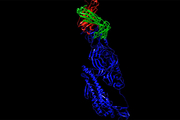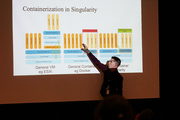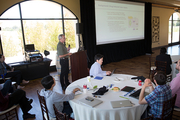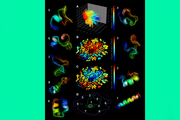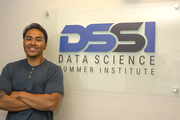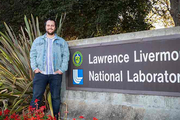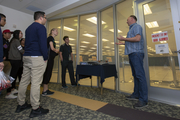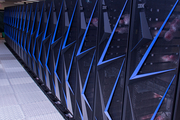Did you know we have a monthly newsletter? View past volumes and subscribe.
Software integration of AI accelerators in HPC (VIDEO)
July 31, 2020 -
In this episode of Next Platform TV, LLNL's Brian Van Essen talks about AI accelerator integration in HPC systems and software stacks. His interview begins at timestamp 27:57. Watch on YouTube.
Lockdown doesn’t hinder annual Data Science Challenge
June 26, 2020 -
Due to the COVID-19 pandemic and shelter-in-place restrictions, this year’s Data Science Challenge with the University of California, Merced was an all-virtual offering. The two-week challenge involved 21 UC Merced students who worked from their homes through video conferencing and chat programs to develop machine learning models capable of differentiating potentially explosive materials from...
Carnegie Live: high energy density science and AI (VIDEO)
June 9, 2020 -
In this Carnegie Live video, Seiichi Shimasaki, Science Counselor for the Japanese embassy in the U.S., described a multiyear science research program (nicknamed the “Moonshot”) to develop new technologies that help solve some of society’s most pressing challenges. He explained that the Government of Japan was looking for a data science program to mentor young scientists, which led to the...
UC Merced students receive NSF research fellowships
June 3, 2020 -
Maia Powell, a PhD student in Applied Mathematics at UC Merced, has been awarded a National Science Foundation Graduate Research Fellowship. Powell participated in the DSI's Data Science Challenge this summer, serving as a team lead for other students. Read more at UC Merced.
Lab team studies calibrated AI and deep learning models to more reliably diagnose and treat disease
May 29, 2020 -
A team led by LLNL computer scientist Jay Thiagarajan has developed a new approach for improving the reliability of artificial intelligence and deep learning-based models used for critical applications, such as health care. Thiagarajan recently applied the method to study chest X-ray images of patients diagnosed with COVID-19, arising due to the novel SARS-Cov-2 coronavirus. Read more at LLNL...
AI identifies change in microstructure in aging materials
May 26, 2020 -
LLNL scientists have taken a step forward in the design of future materials with improved performance by analyzing its microstructure using AI. The work recently appeared online in the journal Computational Materials Science. Read more at LLNL News.
AI hardware for future HPC systems (VIDEO)
May 20, 2020 -
This interview with Brian Spears, who leads cognitive simulations at LLNL, covers the current state of evaluation of AI chips and how those will mesh with existing and future HPC systems. Watch on YouTube.
Interpretable AI in healthcare (PODCAST)
May 17, 2020 -
LLNL's Jay Thiagarajan joins the Data Skeptic podcast to discuss his recent paper "Calibrating Healthcare AI: Towards Reliable and Interpretable Deep Predictive Models." The episode runs 35:50. Listen at Data Skeptic.
The incorporation of machine learning into scientific simulations at LLNL (VIDEO)
May 5, 2020 -
In this video from the Stanford HPC Conference, Katie Lewis presents "The Incorporation of Machine Learning into Scientific Simulations at Lawrence Livermore National Laboratory." Read more and watch the video at insideHPC.
Lab antibody, anti-viral research aids COVID-19 response
March 26, 2020 -
LLNL scientists are contributing to the global fight against COVID-19 by combining artificial intelligence/machine learning, bioinformatics and supercomputing to help discover candidates for new antibodies and pharmaceutical drugs to combat the disease. Armed with the virus’ predicted 3D structure and a few antibodies known to bind and neutralize SARS, an LLNL team led by Daniel Faissol and...
Department of Energy researchers share data management strategies at first-ever “Data Day”
Nov. 11, 2019 -
It’s become something of a mantra of the digital age: Data is the new currency. Especially in science, where it’s hard to find a single project that doesn’t involve generating or consuming massive amounts of data.
In light of the growing awareness of the critical importance of data management across the Department of Energy complex, more than 100 researchers from DOE national laboratories...
Learning about learning: reading group discusses advancements in AI
Oct. 2, 2019 -
Teams from around Lawrence Livermore conduct research using artificial intelligence, and the Data Science Institute’s (DSI’s) Machine Learning Reading Group serves as a resource for employees to keep one another apprised of developments in this ever-changing field.
The group meets weekly to share and discuss new literature on machine learning and deep learning, subsets of artificial...
Collaboration drives data science workshop
Sept. 12, 2019 -
Lawrence Livermore National Laboratory’s (LLNL’s) Data Science Institute (DSI) hosted its second annual workshop on July 23–24, 2019. Co-sponsored by the University of California (UC) system, the event drew more than 200 participants to Garré Winery in Livermore. A common theme ran throughout both days: Collaboration is always welcome.
Indeed, feedback from last year’s workshop inspired a...
Energy Department, Weill Foundation sign MOU to advance AI for biomedicine, health research
Aug. 27, 2019 -
U.S. Secretary of Energy Rick Perry and Sandy Weill, founder of the Weill Family Foundation, signed a memorandum of understanding (MOU) to formally initiate a public-private partnership for artificial intelligence (AI), neurological disorders and related subjects. The MOU will foster collaboration to demonstrate AI-based research breakthroughs that span from basic science focused on a better...
CANDLE illuminates new pathways in fight against cancer
Aug. 16, 2019 -
As part of the Department of Energy’s role in the fight against cancer, scientists are building tools that use supercomputers to solve problems in entirely new ways. Cancer research provides a complex deep learning challenge that enables DOE to develop new supercomputing capabilities that will, in turn, help scientists address challenges in national security and science. The CANcer...
Livermore Lab Foundation awards scholarship to Cal State East Bay computer science student
Aug. 2, 2019 -
Alan Noun, a computer science student at Cal State University East Bay and the recipient of the Livermore Lab Foundation's first full-year scholarship, has started a summer internship at LLNL. In partnership with Cal State University East Bay (CSUEB), the Livermore Lab Foundation (LLF) awarded Noun a one-year stipend to allow him to devote more time to academics by reducing work he needs to...
Protecting image classification in artificial intelligence
July 8, 2019 -
To address vulnerability concerns in image classification, a new subfield of machine learning has emerged called adversarial machine learning, which focuses on the security of machine learning algorithms. Thomas Hogan, a doctoral student of mathematics at UC Davis, spent his summer investigating this new area of research during the National Science Foundation’s Mathematical Sciences Graduate...
Two-week workshop lets UC Merced students step into shoes of Lab computer scientists
June 12, 2019 -
From May 20-31, 21 undergraduate and graduate students, many of them first-generation college students, interned at the Lab. While they were on site, the students, along with their Lab mentors, were tasked with using machine learning and other computational methods to tackle real-world problems in computational immunology. Read more at LLNL News.
How machine learning could change science
April 29, 2019 -
Artificial intelligence tools are revolutionizing scientific research and changing the needs of high-performance computing. LLNL has been exploiting the relationship between simulation and experiments to build predictive codes using machine learning and data analytics techniques. Read more at Data Center Dynamics.
DOE fueled AI is transforming the world as we know it (VIDEO)
April 5, 2019 -
National Labs are home to some of the most powerful supercomputers in the world. These powerful machines they have the potential to unlock artificial intelligence, providing scientists and researchers the ability to quickly analyze massive datasets for answers to the world's most complex problems. Watch on YouTube.








